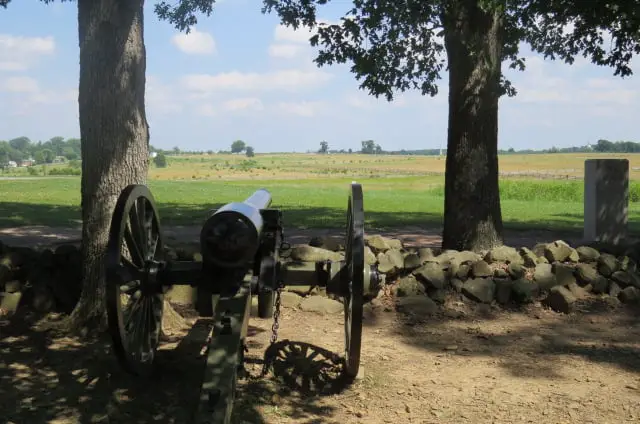Lee rose by starlight, as he had done the previous morning, with equally fervent hopes of bringing this bloodiest of all his battles to a victorious conclusion before sunset. Two months ago today, Chancellorsville had thundered to its climax, fulfilling just such hopes against longer odds, and one month ago today, hard on the heels of a top-to-bottom reorganization occasioned by the death of Stonewall Jackson, the Army of Northern Virginia had begun its movement from the Rappahannock, northward to where an even greater triumph had seemed to be within its reach throughout the past 40-odd hours of savage fighting. Today would settle the outcome, he believed, not only of the battle — that went without saying; flesh and blood, bone and sinew and nerve could only stand so much — but also, perhaps, of the war; which, after all, was why he had come up here to Pennsylvania in the first place.
Lee's reply to this was an order for Pickett to be summoned... The objective was clearly defined against the skyline: a little clump of umbrella shaped trees, four-fifths of a mile away on Cemetery Ridge, just opposite the Confederate command post... By way of softening up the objective, the assault would be preceded by a brief but furious bombardment from than 140 guns of various calibers — this would be the greatest concentration of artillery ever assembled for a single purpose on the continent, and Lee appeared to have no doubt that it would pave the way for the infantry by pulverizing or driving off the batteries posted in support of the Union center.
Pickett's men were unaware of what awaited them beyond the screening ridge... The sun had burned the early morning clouds away, and though the lack of breeze gave promise of a sultry afternoon, the impression here in this unscarred valley behind Seminary Ridge was of an ideal summer day, no different from any other except in its perfection. "Never was sky or earth more serene, more harmonious, more aglow with light and life," one among the marchers afterwards wrote.
By now it was noon, and a great stillness came down over the field and over the two armies on their ridges. Between them, the burning house and barn loosed a long plume of smoke that stood upright in the hot and windless air. From time to time some itchy-fingered picket would fire a shot, distinct as a single hand-clap, but for the most part the silence was profound. For the 11,000 Confederates maintaining their mile-wide formation along the wooded slope and in the swale, the heat was oppressive. They sweated and waited, knowing that they were about to be launched on a desperate undertaking from which many of them would not be coming back, and since it had to be, they were of one accord in wanting to get it over with as soon as possible. "It is said, that to the condemned, in going to execution, the moments fly," a member of Pickett's staff wrote some years later, recalling the strain of the long wait. "To the good soldier, about to go into action, I am sure the moments linger. It is the nervous anxiety to solve the great issue as speedily as possible, without stopping to count the cost. The Macbeth principle — 'Twere well it were done quickly — holds quite as good in heroic action as in crime."
Shelby Foote, from "Stars in Their Courses: The Gettysburg Campaign"












































































































































































No comments:
Post a Comment